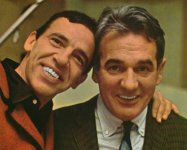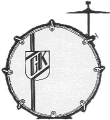Willis Conover for Voice of America Radio.



| Conover: Gene,
what was the first time that you heard Buddy play? Gene: Uh, actually, I heard Buddy play when he joined Tommy Dorsey's orchestra in-I don't know exactly when he joined, but this was in, I'd say, 1939. At the Palmer House in Chicago. And the only reason I didn't hear him before then was I was scared to death. Because the guys in Goodman's band-like Harry James and all the chaps-used to come by and say, 'Man this kid over at the Hickory House is going to scare you to death. Wait 'til you hear him." I'm often asked the question, particularly since I've gone into the drum school business, along with Cozy Cole, we have a studio in New York-I'm very often asked "How about natural talent against studied technique and so forth?" Well, I've watched everybody rather closely, and there are three giants in the drum world, and of these three Buddy stands out head and shoulders. They are Buddy Rich, Ray Bauduc, and Ray McKinley. When I speak of natural drummers I'm talking about guys that are playing with the talent God gave 'em. But here's an amazing thing. While this isn't true of either Ray-McKinley or Bauduc-it's true of Buddy. You can watch Buddy play and actually if you watch him, you'd think he's the most studied person in the world. And even Buddy himself will make something-like, we'll be in the dressing room, he'll pick up a pair of sticks and say: "Well, what is this?" And he'll rattle a little bit and actually, if I break it down, get him to do it slow enough, I can name it. I can break it down into whatever it is. And inherently, naturally, he fingers all these things correctly. Now, I know why this is. But let me tell you something. No doubt when he was a young child-he doesn't remember this, he told me himself-when he was a young child and standing around for his daddy to rehearse his act and things in the old vaudeville days, well, those old pit drummers were just wonderful. Every one of 'em. Well, now y'know, this little kid standing around? He's got to absorb all these things. That's how come the wonderful left hand. That's how come the great ambidexterity which is absolutely necessary for a good drummer. To me he's the greatest. Conover: Buddy, what's your rebuttal to that? Or is there? Is "rebuttal" the word? Buddy: Well, now, you put me in a very embarassing position. I don't know how to answer a thing like that. That's probably the greatest compliment that has ever been paid to me by anyone, especially when it comes from such a giant as Gene. Because, as everyone knows, anybody who knows anything about drums-and this is not going to sound like an Alphonse and Gaston type reply-uh...Gene is absolutely the first man when it comes to drums. The inspiration for every big-name drummer in the business today, I think. I think at one time every drummer wanted to play like Krupa or wanted to win a Gene Krupa drum contest. This is the big inspiration for drummers and naturally it has to be the same way for me. After hearing Gene with Benny for so many years and listening to the recordings and everything, uh, this is the guy the kids want to play like more than anybody else. And just like anybody else the same goes for me. This is my man and, uh, you can't say any more. This is the President. And, uh, that's it. Conover: Well, how do you agree with Gene's definition of intuitive or natural drummers as against trained or studied drummers? Buddy: Well...(laughs) Conover: He has put you in the "natural" drum class. Buddy: I'm a lucky one you see? I think-and I think Gene will agree-I think to be an expert at anything, I think the best thing to do is study. I've tried, but I'm too stupid. I can't sit down long enough to absorb any kind of learning.. At one time I wanted to play like Lionel Hampton. I went out and bought myself a set of vibraphones and hired a great teacher, and after about three weeks I never saw the vibraphones again because I just couldn't absorb the things I was being taught. But I think that any young drummer starting out today should get himself a great teacher and learn all there is to know about the instrument that he wants to play. Conover: Well, do you agree with Gene's selection-excluding yourself, out of modesty of course-of the greatest drummers today or the greatest drummers of the past? Buddy: Definitely. I think Bauduc is one of the truly great drummers and of course McKinley rates right along with him. But Gene left out two... Gene: Mm. All: (Laughs) Buddy: He left out two of my boys and I'm sure they're his boys, too. Conover: Can I see if I can name them, 'cause you've never mentioned this before? Buddy: (Laughs). Go ahead Conover: I would say Jo Jones and Sid Catlett. Now maybe I'm wrong. Buddy: Well, Sid Catlett of course deserves to be in that company. But he left out CH-the daddy of 'em all. (Krupa and Rich laugh) Buddy: Chick Webb! But of course Jo Jones. My all star drummers would be Gene, Jo Jones, Chick Webb, McKinley, Bauduc, and Catlett. Those...everybody had a distinctive style, and certainly great technique, and they sure could swing a band. Conover: Well, since both of you were, uh, already in the prime before many of the young drummers of some of the new movements of jazz came along, uh, you've been in a good position to get an opinion of how drummers such-well I won't mention names because I don't know what your answers are going to be, but how those drummers compare both with the drummers before-or who were established before-and also in relationship to the music that they're playing today. Gene: Mm-hmm. Well, Willis, I'd say that the "new music" actually hasn't found itself enough yet to...to...to showcase a drummer. Do you agree with that Bud? Buddy: Well, I don't even think, uh-I don't want to get into this discussion because... Gene: (Laughs) Buddy: I have a definite and very set opinions about the so-called modern school of music and drummers. Whereas in the days when it was necessary to swing a band, where a drummer had to be a powerhouse, today more or less the "cool school" has taken over, and I don't believe there's such a thing as a "cool drummer." You either swing a band or don't swing a band and that's what's lacking today.. There aren't any guys who get back there and play with any kind of guts. And I like a heavyweight. I'm not a flyweight. I like-in my fighting, I like heavyweights and in my music I like emotionally good, strong heavyweight type of jazz. And it's just lacking today. Conover: Well, how do you feel about the idea of drums used almost as a melody instrument rather than just a rhythmic instrument? Buddy: Well, it would be very nice if you could play a melody on it. But primarily, the drummer's supposed to sit back there and swing the band. Am I right? Gene: Yeah. If you're going to start with melody you'll need some tympani, I think. Buddy: (Laughs). And some tunable tom-toms. Both: (Laugh). Gene: That's right. Buddy: I think the drummer should sit back there and play some drums, and never mind about the tunes. Just get up there and wail behind whoever is sitting up there playing the solo. And this is what is lacking, definitely lacking in music today. Gene: Well, that's Buddy's big...big tip. I mean. uh, he can play so hard, and yet make a sound, rather than a, a, a noise. Conover: Well, how do you set up these drum battles? Because we'd like to hear one of your performances together at a Jazz At The Philharmonic... Gene: Well, you know the nice thing about it? They're not set up! Conover: There's no agreement in advance? Buddy: No.(laughs) Gene: No. We get up there and we wail. I don't think two nights have been alike yet. Buddy: No. Gene: (Laughs). Buddy: And they never will be because then it would get kind of stiff, boring kind of thing. I think we get up on the stand every night and we look at each other and you listen to all the comments that come at you from the audience. Naturally, they're partisan groups and they're all shouting for their favorites, and we sit down at the drums and we laugh, and some nights Gene'll start a tempo or other nights I'll start the tempo. And we just start to play. And some nights it's great, and other nights it's laughs, and other nights it's boring, because that's what makes-anything that's spontaneous is a-it's a free feeling. We get up there and play just exactly what we feel like that particular night. When we play places like Carnegie Hall where the places are sold out we know that the people are listening uh, we play good. We play other places where we don't think there's too much interest-rather than listening-I think that people would rather be heard themselves-so we let them scream and we play under them. Conover: (Laughs). Buddy: But we have...we have a ball doing it. I'm sure that Gene will say just about the same thing. Gene: I'll bear you out, Bud. Sure. Conover: Well, let's listen to one...one of a number of drum battles, or let's say happy challenges, between Gene Krupa and Buddy Rich at the drums. Gene and Buddy, it's been a pleasure having you with us for the full hour today. Buddy: Well, it's been a great pleasure to be here with you Willis. And we hope everybody listening enjoyed it half as much as we've enjoyed being able to sit down here and talk with you, and talk with Gene, and really get to feel free to express exactly what we feel about each other. It's been a kick. Gene: For me too. And I may say, Willis, that we've been out on Jazz At the Phil for two weeks now, and this is the first show we've made, and of course we'll be over across the ocean in the little bit too, and hope to see all you guys then. |
